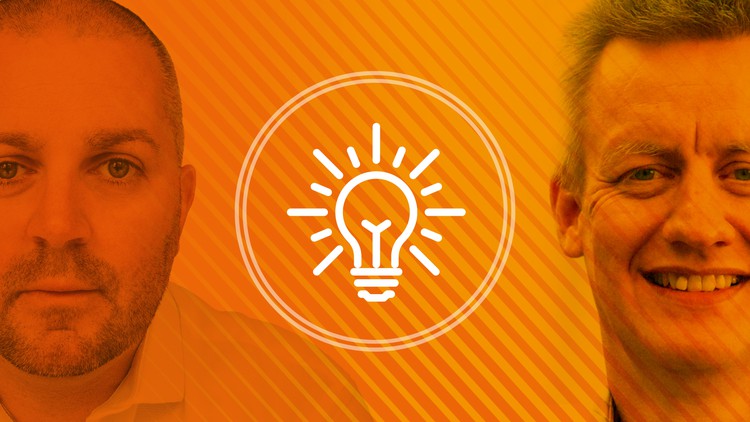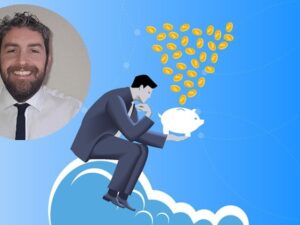The Business, Innovation and Entrepreneurship Masterclass
- Description
- Curriculum
- FAQ
- Reviews
- Grade

Are you brimming with business ideas but unsure of how to get started? If you’re new to entrepreneurship and crave more confidence and business acumen before launching your venture, we’ve got you covered.
Business and entrepreneurship are like peas in a pod; understanding one requires a solid grasp of the other. Our comprehensive entrepreneurship training course is designed to equip you with the knowledge and assurance necessary to launch your business endeavour successfully.
While innovation and entrepreneurship are closely intertwined, it’s important to appreciate their subtle differences. Innovation involves creatively solving problems with fitting solutions, while entrepreneurship involves applying innovation to transform ideas into financially sustainable realities.
Throughout this course, you’ll delve into the true essence of entrepreneurship and master the art of successful business (or product) planning. Moreover, you’ll discover strategies to maintain a steady growth trajectory once your business takes off. For aspiring entrepreneurs, this course serves as a solid foundation upon which to build future endeavours.
This course is perfect for those seeking insight into starting a business, whether you’re exploring your entrepreneurial potential or have a trove of business ideas waiting to be implemented.
Successful entrepreneurship demands two essential qualities: business acumen and a determined mindset. As you progress through the course modules, you will have an opportunity for:
-
Enhancing self-awareness and improving business effectiveness.
-
Identifying new avenues for business innovation and financial growth.
-
Mastering a practical framework for evaluative business planning.
-
Developing effective methods for business communications.
-
Establishing relevant, timely and inspiring business goals.
-
Cultivating a growth-oriented and entrepreneurial mindset.
-
Achieving success even with limited financial resources.
-
Applying your learnings to real-time entrepreneurial projects.
-
And much more, unlocking a wealth of knowledge and expertise.
Entrepreneurship training is a solid foundation for fostering the innovative ideas our world needs to progress in the 21st century. It encompasses more than just initiating a business; it encapsulates creativity, innovation, resilience, and leadership. This exceptional online training, open to anyone with a business idea or a budding startup, presents an unparalleled opportunity to cultivate your entrepreneurial vision, transforming it into something enduring.
“The Business, Innovation, and Entrepreneurship Masterclass” provides an immersive online experience meticulously designed to introduce indispensable tools and foster the entrepreneurial mindset required for success. No idea or team is necessary, only a willingness to explore your entrepreneurial potential.
Learn from the invaluable insights and experiences of two distinguished Scottish entrepreneurs, Russell Dalgleish and Kain Ramsay, who have collectively guided over 20 businesses to national and international triumphs as investors and consultants. Drawing on their expertise, this course equips you with actionable ideas to propel the growth and development of your startup.
Throughout this comprehensive course, you will gain lifetime access to over 16.5 hours of video-based training and valuable course resources. There are no time constraints, allowing you to study at your own pace while accommodating your existing commitments.
In a world that yearns for students eager to make a positive entrepreneurial impact, studying and mastering the art of innovative entrepreneurship has never been more attainable. Moreover, the course offers the flexibility to learn anytime, anywhere, and on any device, all backed by a full money-back guarantee.
Enrol today, risk-free, and embark on your entrepreneurial journey.
-
1Welcome to the Business, Innovation & Entrepreneurship Masterclass
Welcome to the Business, Innovation & Entrepreneurship Masterclass, presented by Kain Ramsay and Russell Dalgleish, two of Scotlands most admired twentieth-century entrepreneurs.
In this video, Kain will take a few moments to introduce the training course and the knowledge you can expect to gain over our next 16.5 hours of video-based instruction together.
-
2How to Access Udemy Support and FAQ Articles
A short article providing some basic course instructions, signposting towards Udemy Support and where you can access Udemy support for any questions or issues that you have whilst using the Udemy website.
-
3What is Entrepreneurship?
Entrepreneurship refers to the process of creating a new enterprise and bearing its risks, with the view of making the profit. The person who builds a new enterprise and embraces every trial for its growth and development is known as an entrepreneur.
In this video, Kain and Russell discuss what an entrepreneur is and how this differs from an employee or a freelancer. They highlight that as we progress as an entrepreneur, it's vital to leverage the efforts of others.
-
4The Six Phase Entrepreneur's Journey
There are six phases in every business life cycle. But to get to the last stage, founders must overcome many hurdles. They must solve a real problem for their customers, scale successfully and build a strong team.
In this video, Kain presents the journey of entrepreneurship; for most entrepreneurs, it's our frustrations that give us a sense of purpose to our efforts. Successful entrepreneurs are those devoted to personal growth.
-
5Dialogue about the Entrepreneur's Journey
In this video, Kain and Russell discuss the six different phases of the entrepreneur's journey, and also the mindset that is required by those who aspire to turn their visions and ideas into tangible realities.
They both share examples of how there's no 'right' or 'wrong' way to build a business; what's vital that we identify the opportunity of what's currently within our grasp. Entrepreneurs turn nothing into something.
-
6Four Expressions of Entrepreneurial Innovation
In this engaging discussion, Russell and Kain talk about why innovation is increasingly vital to driving corporate growth and brings to life the four expressions of innovation that new entrepreneurs might engage in.
Russell and Kain share their experience of pursuing concepts that disrupt institutions that already exist. They also highlight the importance of developing a robust professional network and partnering with experts.
-
7Some Excellent News for Rule Breakers!
In this video, Kain presents an idea once proposed by Jurgen Habermas', a social philosopher, who suggested that the progression of society is dependant upon defiance of its traditions - what entrepreneurs do!
He also emphasized that we want to pull together advocates of our ideas; collaborative partnerships who buy into our plans. The businesses that tend to flourish are those that positively advance society in some way.
-
8The Key Advantages of Starting a Business
With the right planning, effort and a little bit of luck, this year could be a great year to start a business. But why would you want to go it alone in the first place? What are the advantages of starting up a business?
There are many benefits to starting your own business, including Rewards and being your own boss. In this video, Kain and Russell discuss some of the main advantages of starting your own business.
-
9The Four Categories of Innovative Idea
The problem with innovative businesses is that because they are new, and their products are also new, no one knows what the demand for them will be, and how well they will grow, or find market acceptance.
We all have ideas of what we hope to achieve in business. These ideas form the basis for the future vision we craft and the goals we commit to. In this video, Kain discusses the four different categories of idea.
-
10Where do Entrepreneurial Ideas Come From?
In this video, Kain and Russell discuss where business ideas come from. Russell discusses how ideas emerge from problems; when we see a problem in society, this sparks ideas about how we can resolve them.
They together discuss the risks of building a business based on passion, rather than on a real-world problem. The scale of the problem you identify will indicate the scale of the market for an exciting new business.
-
11Knowing the Difference Between Assets and Liabilities
Kain and Russell discuss the 'Rich Dad' simple definition of an asset and a liability: an asset is something that places money in your pocket and a liability is something that takes money out of your pocket.
As entrepreneurs, the greatest asset we have is our time. Use it wisely! Some people say that "time is money", but it's more than that. Time is our greatest asset, and how we use it will define what we achieve in life.
-
12Defining Your Entrepreneurial Vision and Goals
An entrepreneurial vision reflects what you want your venture to become, what this venture will look like, what the motivating forces are, and what values and culture should surround it. Each entrepreneur has a unique picture of what the venture will ultimately become.
The vision that we commit to pursuing, as entrepreneurs, gives a basis for our priorities, our decision making, and how we choose to invest our time.
-
13Ikigai: Finding Your Direction in Life
A combination of the Japanese words "iki" (生き), which translates to "life," and "gai" (甲斐), which is used to describe value, ikigai is about discovering satisfaction in life through purpose-driven works.
In other words, where; what you love meets what you are good at, meets what you can be paid for meets that which the world needs. Ikigai is only complete if the entrepreneurial goal provides service to a community.
-
14Ideas come First, Vision comes Second
The extent of your entrepreneurial vision matters for one reason, and one reason only: it helps to inform every action you take in the future. Vision can aid you as a decision-making tool (just like your core values).
Vision can help give you direction on what to work on next. They can help you to say no to more things if they don't align with the broader vision that you have for your long-term entrepreneurial endeavours.
-
15The General Risks of Entrepreneurship
Entrepreneurs face multiple risks such as financial risk, competitive risks, environmental risks, reputational risks, and political and economic risks. Entrepreneurs must always plan wisely in consideration of risk.
Kain and Russell share insights about the economic climate of the world in response to the COVID pandemic and how much opportunity and support is now available worldwide for those who want to start a business.
-
16Focus and Consistency in Entrepreneurship
Have you ever wondered how some people can produce extensive amounts of success in their field of entrepreneurial endeavour, while others work equally as hard but accomplish very little?
To be consistent means to dedicate yourself to a task, activity or goal fully. Consistency means to stay engaged without distraction - Russell and Kain discuss how this is the effective entrepreneur's secret weapon!
-
17Essential Questions for Entrepreneurs to Ask...
Working for yourself, you may not have the same lifestyle you had when employed, and you may not generate any substantial revenues for months (or years). There are some questions every entrepreneur needs to ask.
Customer satisfaction is the lifeblood of your business, so this must be something you're endeavouring to maintain. Kain and Russell discuss the importance of consistent visibility and transparency in our companies.
-
18Contrastive Analysis: Fixed & Growth Mindsets
In this video, Kain distinguishes the significant differences between fixed mindsets and growth-oriented mindsets. Successful entrepreneurialism centres around innovative and growth-orientated thinking.
He discusses how these fundamental mindsets form, what their defining characteristics are, and how we can adapt the considerably more fruitful and nourishing growth mindset.
-
19FAQ's: Frequently Asked Business Questions
In this video, Kain and Russell have a conversation around some of the commonly asked questions of entrepreneurship. Including;
How to earn money and keep it?
What habits have contributed to your success?
How do you define success in your own life?
-
20Investing Your Time and Energy Wisely
Suppose you are interested in becoming financially secure and living a life free from debt and financial stress. In that case, you will be interested in learning how you can invest your time, money, and energy wisely.
Each day we have 24 hours to spend or invest however we choose. While employees typically think about how to have more gratifying experiences in this time, entrepreneurs consider getting a return on their investment!
-
21Setting Efficient Business, Partnership & Financial Goals
One of the critical aspects to fulfilling your business goals is knowing how to set smart goals. It's important to have a vision; establish a plan of how to achieve it and then adjust our approach, accordingly when necessary.
Our plans must have flexibility because there will always be situations out with our control that influence our progress or direction. It's also useful to know what we 'don't know' so to build wise and strategic partnerships.
-
22The Four Distinct Categories of Goal
There are four types of goals: short term goals, medium-term, long term and lifetime goals. When people talk about "having too many goals" they are usually referring the last two: long term goals and lifetime goals - which can seem overwhelming is we have too many of these.
In this video, Kain describes the different types of goals we can pursue and also how each type deserves varying durations of time to fulfil.
-
23Setting Positively Framed Business Goals
The mind doesn't like the negative. We influence ourselves (and other people) well by leading attention towards 'desired outcomes' via 'positive language, rather than unfavourable outcomes by using negative language.
In this video, Kain highlights a significantly useful way we can define goals by framing them in the positive. People who learn how to do this seldom find difficulty in mustering up the motivation to take action.
-
24How to Stay Motivated and Drive Your Business
Motivation is the reason 'why' entrepreneurs and business people do what they do. Motivation is all about the factors that encourage people to be continuously engaged and enthusiastic about their endeavours.
In this video, Kain discusses how our values drive our everyday decision making. Having a solid understanding of what our values are is what enables us to stay motivated to work hard and operate our businesses.
-
25How to Build Effective Working Relationships
Good working relationships give us several other benefits: our work is more enjoyable when we have good relationships with those around us. Also, people are more likely to go along with changes that we want to implement, and we're more innovative and creative.
No person is an island; we need effective working relationships. Russell explains how it's important for him to partner with people who have similar values but different priorities - so to minimize business risk.
-
26Understanding Motivation: Maslow's Hierarchy of Needs
Maslow's hierarchy of needs is a motivational theory in psychology, comprising a model of human needs, often depicted as hierarchical levels within a pyramid. This model helps to understand human decision making.
Maslow's hierarchy is relevant to organizational philosophy as it concerns itself with human motivation. Understanding what people need - and how people's needs differ - is an essential part of practical entrepreneurship.
-
27The Eight Domains of Social Influence
In this video, Kain discusses consumer and contributor mindsets. Influential business people are those who find a way to contribute back into society; changing the world in a financially sustainable way.
Social influence involves how people change their priorities to meet the demands of a social environment. Entrepreneurs must understand social structure if they are to maximize the extent of their innovative impact.
-
28Understanding the Relevance of a Business Plan
A business plan is where you capture several variables so to evaluate the risks of your business idea. The most crucial part is the market analysis you conduct to establish the likely success of your idea.
We might write a business plan for different reasons: to capture the ideas in your head, to apply for a loan or funding, to explain the business to a new potential partner. The key is that it's simple enough that someone can read the business plan and understand your business.
In this video, Kain and Russell discuss the significance of planning a business based around what the market wants. It's also important to be specific in what the persona of your ideal market looks like.
-
29The Business Planning Demonstration (Part 1)
This video demonstration is a world first. Kain assumes the position of a newly inspired entrepreneur with an idea he is passionate about pursuing.
Russell takes Kain through a structured business planning process (you can access the template for this in the additional course materials).
Observe and pay attention to the questions Russell asks Kain, to critique and evaluate his idea - to thicken his business idea and take it from being a 'loose' abstract concept towards becoming a viable business option.
This video is part 1 of 5.
-
30The Business Planning Demonstration (Part 2)
This video demonstration is a world first. Kain assumes the position of a newly inspired entrepreneur with an idea he is passionate about pursuing.
Russell takes Kain through a structured business planning process (you can access the template for this in the additional course materials).
Observe and pay attention to the questions Russell asks Kain, to critique and evaluate his idea - to thicken his business idea and take it from being a 'loose' abstract concept towards becoming a viable business option.
This video is part 2 of 5.
-
31The Business Planning Demonstration (Part 3)
This video demonstration is a world first. Kain assumes the position of a newly inspired entrepreneur with an idea he is passionate about pursuing.
Russell takes Kain through a structured business planning process (you can access the template for this in the additional course materials).
Observe and pay attention to the questions Russell asks Kain, to critique and evaluate his idea - to thicken his business idea and take it from being a 'loose' abstract concept towards becoming a viable business option.
This video is part 3 of 5.
-
32The Business Planning Demonstration (Part 4)
This video demonstration is a world first. Kain assumes the position of a newly inspired entrepreneur with an idea he is passionate about pursuing.
Russell takes Kain through a structured business planning process (you can access the template for this in the additional course materials).
Observe and pay attention to the questions Russell asks Kain, to critique and evaluate his idea - to thicken his business idea and take it from being a 'loose' abstract concept towards becoming a viable business option.
This video is part 4 of 5.
-
33The Business Planning Demonstration (Part 5)
This video demonstration is a world first. Kain assumes the position of a newly inspired entrepreneur with an idea he is passionate about pursuing.
Russell takes Kain through a structured business planning process (you can access the template for this in the additional course materials).
Observe and pay attention to the questions Russell asks Kain, to critique and evaluate his idea - to thicken his business idea and take it from being a 'loose' abstract concept towards becoming a viable business option.
This video is part 5 of 5.
-
34Business Planning Demonstration Deconstruction
In this video, Kain and Russell have a conversation about the business planning process, emphasizing that Kain HAS NOT come away from the consultation session with a formal business plan document.
Business planning is more about the process of scrutinizing a business idea than the end document that is produced. Kain is now clearer on the areas he must research and consider to move the business idea forward.












